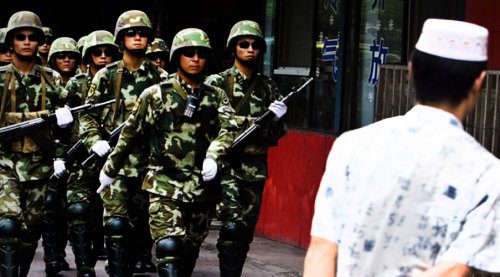Time to sanction rights-abusing Chinese officials under Canada's Magnitsky Act, experts say
Not a single Chinese official has been listed under the legislation since it was implemented 18 months ago

Uyghur activists protest outside a court appearance for Huawei Chief Financial Officer, Meng Wanzhou, at the British Columbia Supreme Court in Vancouver, on May 8, 2019.

China has confined over two million members of its Uyghur minority in camps where language and religion are systematically suppressed, a frightening aspect of a vast cultural...democide.
Beijing has also detained a Canadian diplomat and businessman in harsh conditions, and locked up numerous local dissidents in the same type of “black jail.”

That seems like exactly the kind of behaviour contemplated by Canada’s version of the Magnitsky Act, a much-heralded law that imposes sanctions on corrupt and rights-abusing foreign officials.
Yet not a single Chinese official has been listed under the legislation since it was implemented 18 months ago.
Some experts say it’s time for that to change, despite the already toxic relationship between the two countries. They’re urging the government to look at adding People’s Republic functionaries to those of five other nations already targeted by the Justice for Victims of Corrupt Foreign Officials Act.
“This is the least we can do,” said Errol Mendes, a University of Ottawa law professor who believes the Uyghurs’ plight represents a “massive” crime against humanity. “It will still no doubt attract even more repercussions from China, but it’s a price we have to pay if we believe in where we stand since the Second World War — that we cannot let it happen again.”
If Chinese leaders do not hold themselves accountable … at least we in Canada should be imposing visa bans, assets seizures and the like
Human Rights Watch also recommended in a report on the Uyghurs earlier this month that governments use Magnitsky laws and other targeted sanctions against Beijing’s officials.
And it is not just the Muslim minority who are prompting thoughts of China and the legislation. In December, the Falun Gong’s Canadian branch provided Foreign Affairs Minister Chrystia Freeland with a list of 14 names of individuals it says masterminded persecution of that religious group.
“This is a situation for which Magnitsky was intended to be used,” said Irwin Cotler, a leading, Montreal-based human-rights lawyer and former federal justice minister. “If Chinese leaders do not hold themselves accountable … at least we in Canada should be imposing visa bans, assets seizures and the like.”

Practitioners of Falun Gong gather in front of Belleville city hall on Friday July 29, 2016 in Belleville, Ont.
Magnitsky sanctions could deliver more than just a moral sting, experts say, given evidencethat many senior officials in the regime have likely transferred wealth to Canada.
Adam Austen, a spokesman for Freeland, said Canada has publicly and privately condemned mistreatment of the Uyghurs, and will continue to raise the human rights situation in China “at every possible opportunity.”
But he declined to respond to questions about whether the government would actually consider wielding Magnitsky against Chinese officials.
The first Magnitsky Act was passed by the U.S. in 2012, designed initially to sanction Russian officials involved in the prison death of a lawyer investigating a sweeping tax fraud.
Canada followed suit with its own law in October 2017, applying it to authorities in any country complicit in “gross violations” of human rights or corruption.
The legislation allows the government to freeze assets here belonging to the listed individuals, bar them from the country and prohibit Canadians from doing business with them.
The catalogue of names now includes 30 Russians, 19 Venezuelan officials, three from South Sudan, one leader in Myanmar and 17 Saudi Arabian citizens linked to the murder of journalist Jamal Khashoggi.
But if there is relatively little at stake — economically at least — in confronting those places, China is a different matter. Canadian leaders have long stepped lightly around human-rights issues there, fearful of imperilling this country’s second-largest trading relationship.
The furious Chinese response to Canada’s arrest of Huawei Technologies executive Meng Wanzhou, though, has led to calls for a tougher stance, such as invoking Magnitsky.
“I think that Canadians would want their government to start showing some backbone,” said Charles Burton, a former diplomat in Beijing and China expert with Ontario’s Brock University. “My feeling is that if we showed some commitment to our values, we would gain more respect with China.”
Experts advise targeting Magnitsky sanctions at the architects of specific policies, rather than broadly censuring members of the ruling Politburo. Likely candidates include governor Shohrat Zakir of Xinjiang — the province where most Uyghurs live and where the camps have been set up — and the region’s party chief, Chen Quanguo,
Targeted sanctions could still have a significant impact, given the well-documented flow of Chinese cash into Canada, some of which is likely tied to government figures, said Burton, also a fellow with the Macdonald Laurier Institute.
As an example of such connections, he pointed to the fact that Xi’s older sister, Qi Qiaoqiao, a wealthy businesswoman, once lived in Canada.
Uyghurs in Xinjiang are subject to an Orwellian system of surveillance, but it is the camps — holding an estimated 800,000 to 2 million people — that have drawn the most attention. Chinese officials liken them to “boarding schools,” providing vocational training and discouraging extremism. Former internees, however, say occupants are compelled to renounce Islam and embrace the Communist leadership.
No comments:
Post a Comment
Comments always welcome!